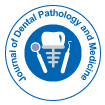Unsere Gruppe organisiert über 3000 globale Konferenzreihen Jährliche Veranstaltungen in den USA, Europa und anderen Ländern. Asien mit Unterstützung von 1000 weiteren wissenschaftlichen Gesellschaften und veröffentlicht über 700 Open Access Zeitschriften, die über 50.000 bedeutende Persönlichkeiten und renommierte Wissenschaftler als Redaktionsmitglieder enthalten.
Open-Access-Zeitschriften gewinnen mehr Leser und Zitierungen
700 Zeitschriften und 15.000.000 Leser Jede Zeitschrift erhält mehr als 25.000 Leser
Indiziert in
- Google Scholar
- ICMJE
Nützliche Links
Open-Access-Zeitschriften
Teile diese Seite
Abstrakt
Assessing the degree of acceptance of dental treatments by children and adolescents through the use of behavioural treatment techniques
Madalina Croitoru
The purpose of this paper was to determine if behaviour management can modify in a positive manner the degree of acceptance of dental treatment in children and adolescents and to assess the influencing factors of the patients’ behavioural pattern.
One of the cornerstones in practicing paediatric dentistry is the ability to guide children positively throughout their dental experience and encourage positive dental attitude in order to improve their oral and overall health. Anxiety associated with the dental procedures can be reflected in the child’s behaviour. Therefore, it is important for dentists to evaluate psychological personal traits and to modify the management approach to reduce their anxiety.
A cross-sectional study was performed on 312 children aged 2 to 14 years (m.a. 6.44±0.19 years) attending the Pedodontics Dental Clinic of the “Carol Davila” University of Medicine and Pharmacy in Bucharest, Romania for routine dental care. The improvement of the patients’ behavioural pattern was attempted using the “tell-show-do” technique, positive reinforcement, ART technique, voice modulation, systematic desensitivation, non-verbal communication and behavioural modelling. Their behaviour was evaluated using Frankl’s scale at every visit at the clinic. Statistical analysis was performed using PSPP 1.2 afp005.
A positive modification of the behavioural pattern was recorded in 93.7% of cases. The main factors influencing the behavioural pattern were age and the use of ART techinique (p<0.05).
Behavioural treatment can be a valuable tool in improving the acceptance of dental treatments in children and adolescents
Zeitschriften nach Themen
- Allgemeine Wissenschaft
- Biochemie
- Chemie
- Genetik und Molekularbiologie
- Geologie und Geowissenschaften
- Immunologie und Mikrobiologie
- Klinische Wissenschaften
- Krankenpflege und Gesundheitsfürsorge
- Landwirtschaft und Aquakultur
- Lebensmittel & Ernährung
- Maschinenbau
- Materialwissenschaften
- Medizinische Wissenschaften
- Pharmazeutische Wissenschaften
- Physik
- Sozial- und Politikwissenschaften
- Umweltwissenschaften
- Veterinärwissenschaften
Klinische und medizinische Fachzeitschriften
- Anästhesiologie
- Augenheilkunde
- Betrieb
- Dermatologie
- Diabetes und Endokrinologie
- Gastroenterologie
- Genetik
- Gesundheitspflege
- Immunologie
- Infektionskrankheiten
- Kardiologie
- Klinische Forschung
- Medizin
- Mikrobiologie
- Molekularbiologie
- Neurologie
- Onkologie
- Pädiatrie
- Pathologie
- Pflege
- Toxikologie
- Zahnheilkunde

 English
English  Spanish
Spanish  Chinese
Chinese  Russian
Russian  French
French  Japanese
Japanese  Portuguese
Portuguese  Hindi
Hindi